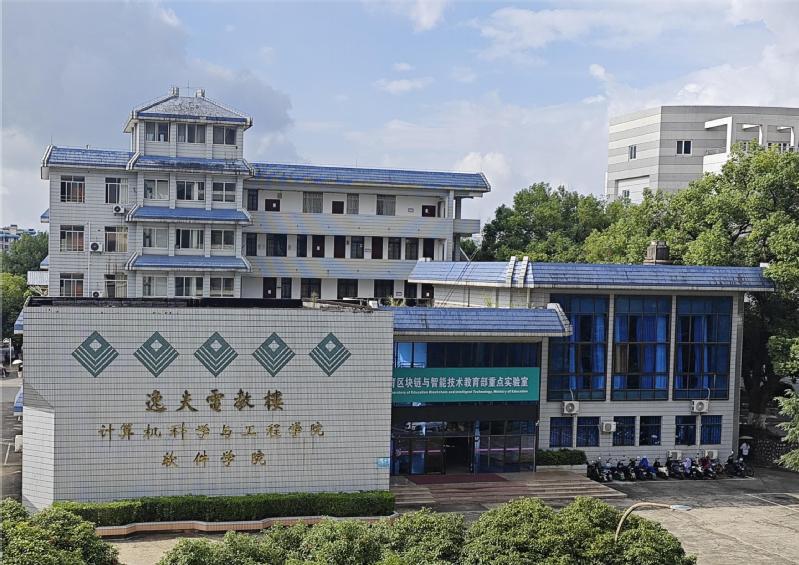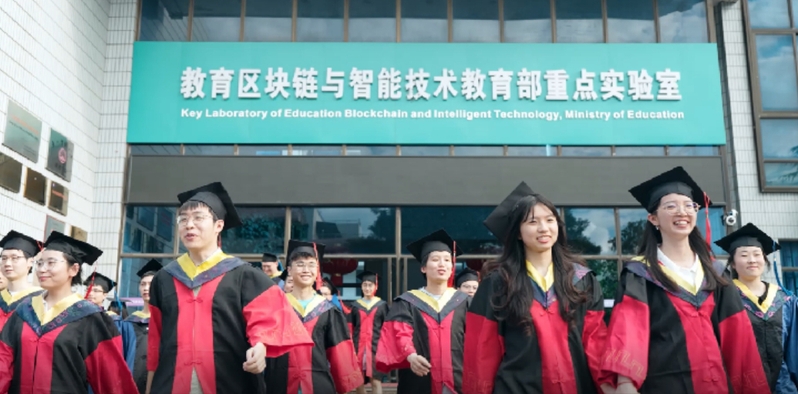

School of Computer Science and Engineering / School of Software was established in February 2006, and the school has developed a comprehensive "undergraduate-master-doctoral" higher education talent cultivation system. In 2018, it became one of the earliest institutions in Guangxi to grant doctoral degrees in computer-related disciplines, specifically in Software Engineering, which is also recognized as a Guangxi First-Class Discipline and a National First-Class Undergraduate Program.
I. Historical Development
September 1984: The Department of Mathematics began enrolling junior college students in Computer Applications, making it one of the earliest departments in Guangxi to offer computer-related programs.
1996: Renamed the Department of Mathematics and Computer Science, it started admitting undergraduates in Computer Science and Technology and obtained a master's degree authorization in Computer Software and Theory in 1998, becoming one of the first institutions in Guangxi to grant computer-related master's degrees.
February 2006: The university restructured its academic resources, merging the original School of Mathematics and Computer Science, School of Physics and Information Engineering, and Modern Education Technology Center to establish the College of Computer Science and Information Engineering.
2008: The Computer Experimental Teaching Center was approved as an Autonomous Region-level Experimental Teaching Demonstration Center.
2010: Launched the Information Security undergraduate program and obtained first-level master's degree authorization in Computer Science and Technology.
2011: Awarded first-level master's degree authorization in Software Engineering.
2012: Approved to establish the Guangxi Key Lab of Multi-Source Information Mining and Security.
2013: Introduced the Software Engineering undergraduate program, obtained professional master's degree authorization in Software Engineering, and established the Guangxi Collaborative Innovation Center for Multi-Source Data Integration and Intelligent Processing.
November 2014: The School of Software was founded, and the institution was renamed College of Computer Science and Information Engineering / School of Software.
2016: The Collaborative Education Platform for Computer Science and Information Technology was recognized as an Autonomous Region-level Collaborative Education Platform.
2018: Granted first-level doctoral degree authorization in Software Engineering.
2019: Approved as the Guangxi Talent Hub for Big Data Intelligence and Applications.
2020: Launched the Data Science and Big Data Technology undergraduate program.
April 2021: Renamed School of Computer Science and Engineering / School of Software to align with the university’s strategic development.
October 2022: The School of Software was designated as an Autonomous Region-level Specialized Model Software School.
March 2023: Key Lab of Education Blockchain and Intelligent Technology, Ministry of Education, as approved as a Ministry of Education Key Laboratory.
July 2023: The Software Engineering program passed the China Engineering Education Accreditation.
October 2023: Established a Postdoctoral Research Station in Software Engineering.
January 2024: The Cybersecurity Talent Training Base was recognized as part of the second batch of Guangxi Cybersecurity Talent Training Bases.
April 2024: The Computer Science Elite Student Training Base was selected as an Autonomous Region-level Base for Cultivating Top Students in Fundamental Disciplines.
II. Distinctive Features
(1) Strong Faculty Team:
87 faculty members, including 62 full-time teachers: 23 professors, 18 associate professors, 49 PhD holders, and 19 doctoral supervisors, including 2 part-time/academician professors, 2 recipients of national-level major talent programs, 2 Elsevier Highly Cited Chinese Researchers, 1 Clarivate Highly Cited Scientist, 1 recipient of the national high-level overseas returnee talent grant (among the first 20 nationwide), 1 Ministry of Education New Century Excellent Talent, and 30 provincial-level talents (e.g., Guangxi Bagui Scholars, Guangxi Outstanding Youth).
Hosts 5 innovative research teams, including the Guangxi Talent Hub for Big Data Intelligence and Applications, the Bagui Scholar Team for Intelligent System Security Theory and Technology, and a Guangxi Natural Science Foundation Innovation Team.
(2)Comprehensive Talent Cultivation System:
Offers 1 first-level doctoral program, 2 first-level master’s programs, 1 professional master’s program, and 4 undergraduate programs. Software Engineering is a Guangxi First-Class Discipline and a National First-Class Undergraduate Program; Computer Science and Technology is a Provincial First-Class Undergraduate Program.
2 courses are recognized as National First-Class Undergraduate Courses, and 7 as Autonomous Region-level First-Class Courses.
Software Engineering ranks 22nd nationally (top 15%) in the 2024 Soft Science discipline rankings.
(3)Outcome-Based Education (OBE) Model:
Implements OBE philosophy, integrating outcome orientation, student-centered approaches, and continuous improvement into the talent cultivation process; combines academic forums, innovation bases, research labs, competitions, and professional certifications (e.g., CCF Computer Software Proficiency Certification, Phoenix Education Group 1+X Digital Media Interaction Design Certification, and "Blue Bridge Cup" National Software Competition) to bridge classroom learning with practical training.
Over the past three years, undergraduates secured 48 National Innovation and Entrepreneurship Training Program projects and won over 300 awards in national competitions.
III. Talent Cultivation & Research Achievements
Graduate Employment: Alumni work in Guangxi, the Pearl River Delta, Beijing, Shanghai, Guangzhou, and Hangzhou, employed by leading tech companies (e.g., Tencent, Huawei), universities, research institutes, government agencies, and the military. Hundreds of graduates have pursued master’s degrees at top domestic and international institutions, with a 25% postgraduate enrollment rate for master’s students.
Research Output:
Faculty have won 2 National Science and Technology Progress Awards, 1 National Defense Science and Technology Award, and 10 provincial/ministerial-level awards.
Principal investigators of key projects, including the National 863 Program, 973 Program, National Key R&D Program, Australian ARC Projects, and NSFC Joint Fund Key Projects.
Over the past five years: Secured 65 national-level projects with total funding exceeding 52 million RMB. Published 320+ SCI papers in top journals (e.g., TPAMI, TKDE, TNNLS) and 80+ papers at prestigious conferences (e.g., AAAI, CVPR).
Key milestones:
2020: Won the Guangxi Natural Science First Prize for "Data Selection Models for Classification".2021: Secured a NSFC Regional Joint Fund Key Project on "Precision Secure Computation for Multi-Ethnic Cross-Domain Data Aggregation".
2023: Approved another Joint Fund Key Project on "Neural Network Technologies for All-Weather Intelligent Visual Perception in Guangxi’s Complex Environments".
(Updated in February 2025)

Yifu Building, Yucai Campus

Key Lab of Education Blockchain and Intelligent Technology, Ministry of Education